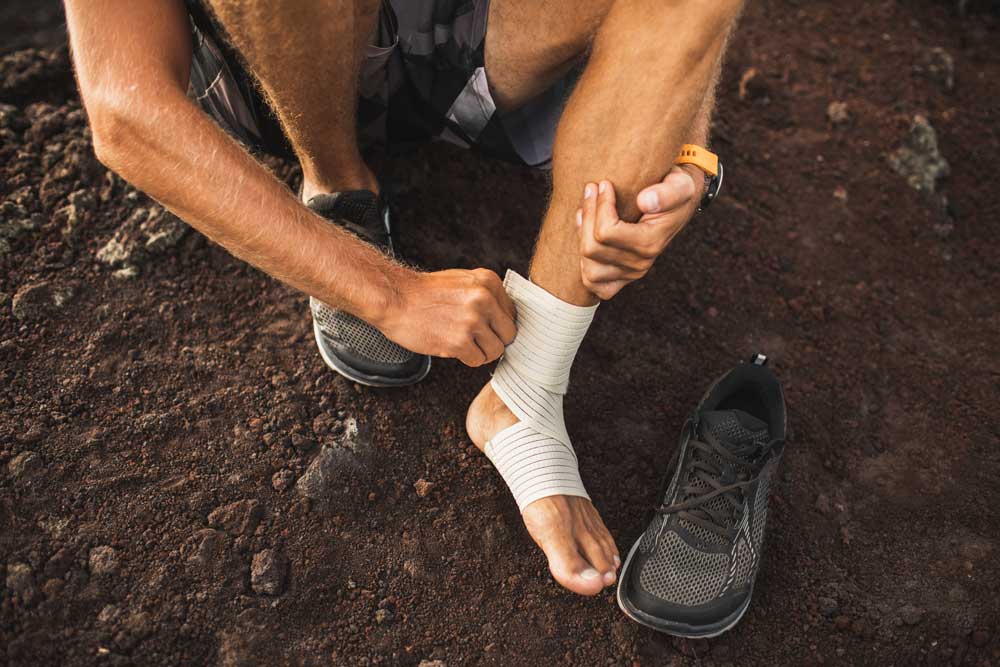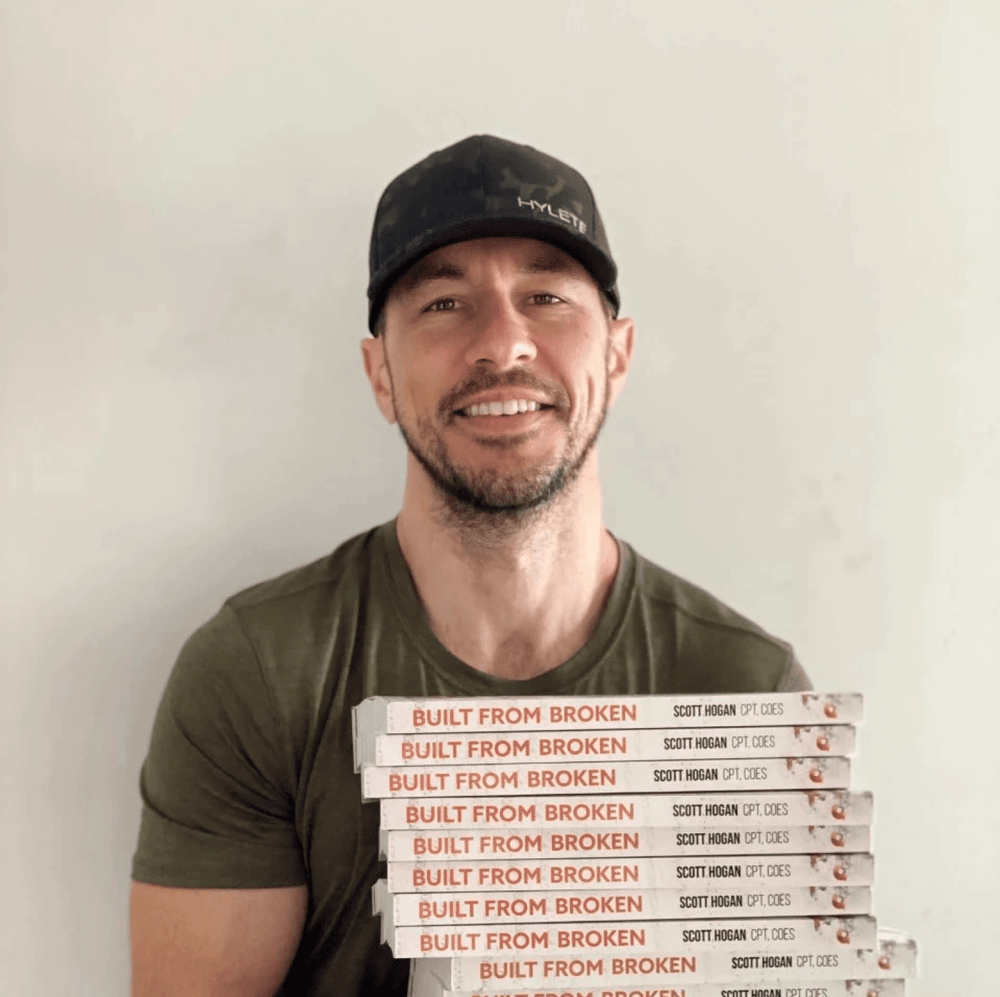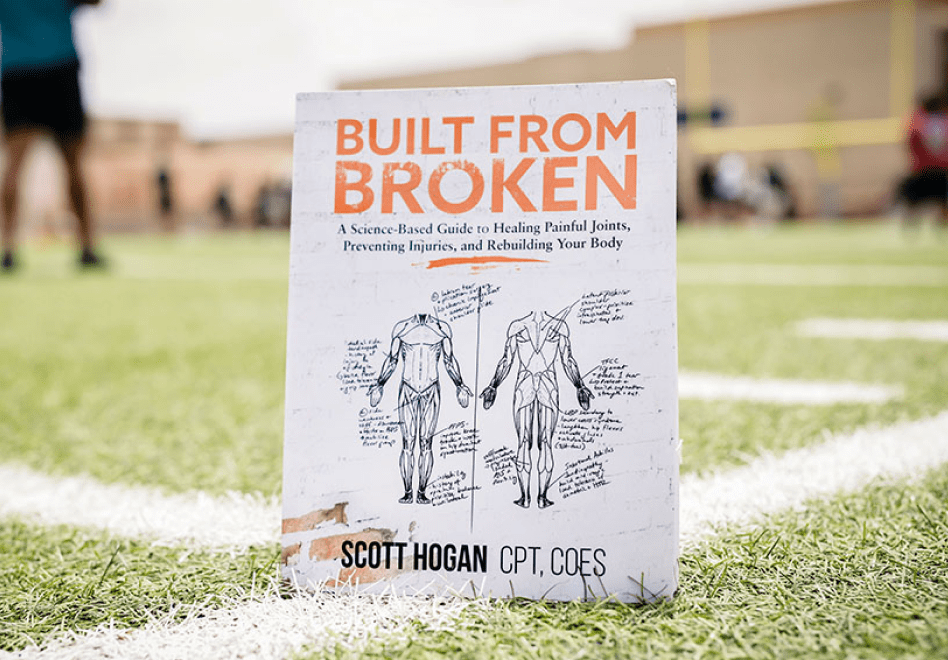
Be built (to last).
The right supplements can help you recover naturally and build a resilient body.

Supplement Quiz
Take this short quiz to discover the perfect supplements for your needs and goals.
About SaltWrap

Built from Broken
Get the best-selling book from SaltWrap founder, Scott Hogan, and start rebuilding today.
How To Turn Fear Into Fuel
By Joe Zagami
Whether you’re an ultra-elite athlete or a dedicated enthusiast, just about every active person wants to control as many variables as possible.
From building the ideal training plan to the optimal macros and timing of our meals, and from the supplements we take to the non-negotiable amount of sleep we need to perform at our best.
We crave control. When we aren’t in control, we feel held back.
This is part of the reason why coming back from injuries can be so challenging. It’s also why something as universal as hitting a plateau in our workouts can make us feel like we’re suddenly doing everything wrong.
But what if I told you that what’s really holding you back isn’t how you approach your training plan, your sleep schedule, or the supplements you take?
Here’s the truth:
After you peel back the many layers, what’s really holding you back from your goals, whatever they might be, is your relationship with fear.
Tony Blauer is a world-renowned performance coach, a pioneer of modern self-defense, and the founder of the KNOW FEAR® system.
“Fear impacts everything we do, from who we talk to, to who we marry, from where we work, to where we live,” he says.
“The ability to recognize and manage fear directly impacts the quality of our life.”
This might sound like a bad thing at first. But here’s the good news, according to Coach Blauer:
"Fear isn’t the enemy. Fear is energy."
And once you learn how to work with it instead of against it, you can unlock new levels of speed, mental clarity, and performance in every aspect of your life — athletic or otherwise.
The last time I had the pleasure of speaking with Coach Blauer, I learned about his origin story and got a high-level overview of his systems. (You can check out that interview HERE.)
But in our most recent sit-down, we dug into Tony’s revolutionary approach to fear.
Not just recognizing or even managing fear, but turning it into energy that fuels performance.
What began as a conversation about mindset for athletes quickly turned into something bigger — and much more important.
Let’s get started.

Image courtesy of Sorinex
"If You Didn't Fear Fear, What Would You Do?"
This simple but powerful question helped start Tony Blauer’s decades-long pursuit of understanding fear. Not just as a primal survival mechanism hardwired into us, but as a decision-making filter that shapes virtually every move we make.
-
The fear of speaking up
-
That voice of doubt before a heavy lift
-
The hesitation before making a tough phone call
According to Blauer, at their core, most of our procrastination, indecision, doubt, and underperformance stem from one source: Fear mismanagement.
And unless you can recognize and confront that fear head-on, you’ll stay stuck in what he calls the Fear Loop. This is a psychological cycle where our fears lead to self-doubt, procrastination, and fixation.
For athletes, the Fear Loop is virtually everywhere.
What if I miss the shot? What if I tear my meniscus again? What if I get knocked out? What if I’m not fast enough? What if I lose the game for my team?
Even if you’ve never played a team sport in your life, the Fear Loop is always lurking in the real world:
-
Not asking your boss for a raise (they could say “no”)
-
Not putting an offer in on a house you love (it could be rejected)
-
Not answering that phone call from an unknown number (it could be bad news)
Fear doesn’t just stop you from acting in the moment. It can steal the one resource we can never have enough of and can never get back: Time.
Fear Management Is Time Management
Here’s one of the most important things you need to know about fear:
Managing fear is the fastest way to manage your time.
Staying in the Fear Loop — where our thoughts start to spiral and we can often feel paralyzed — delays decisions and, most importantly, the actions that follow.
For instance, imagine you didn’t ask for that raise in the example above.
Chances are that with time, you’d start to doubt your abilities, resent your boss, and begin to hate a job you once loved.
This doesn’t just cause unnecessary stress and anxiety. It can also waste untold amounts of your time. Consider how much time you might spend thinking — or catastrophizing — over this.
Would it keep you awake at night? Would it stop you from being present with your friends and family? Would it create a distraction for you at work? (And might this create a performance problem where it didn’t exist before?)
Now, consider how much extra time you would have available to do the things you love — and how much better you might sleep at night — if you didn’t waste precious time worrying about this.
The point is, the Fear Loop isn’t simply a momentary thing.
Tony explains it like this:
“Those who manage their fear manage to fight.”
This isn’t limited to self-defense or combat sports situations. In a world where virtually everything rewards speed — sports, business, life — the ability to manage fear (and stay out of the Fear Loop) can start to feel more like a superpower than a skill.
It’s why the KNOW FEAR® System revolves around the reframing of fear. Because once you can recognize that fear is feedback and not weakness, you can turn it into energy that fuels courage.
In fact, fear is the only necessary ingredient in courage.
“You can’t be brave if you’re not afraid. Fear is the only thing that makes courage possible,” Tony says.
While most high performers are taught to suppress fear, Tony teaches people to acknowledge it, interpret it, and use it.
Because once you know how to navigate fear, you can stop reacting and start responding.
"Those who manage their fear manage to fight."
Coach Tony Blauer
Founder, KNOW FEAR®

"Just Do Two Rounds Twice."
Tony shared one of his favorite — and best — examples of this concept with me.
But, surprisingly, it wasn’t an action-packed retelling of surviving a life-or-death crisis or training a room full of elite military operators.
Instead, it was about a casual conversation Tony had with a young athlete, Sean, in a quiet Montreal locker room before the biggest moment of his fighting career.
“Years ago, an athlete of mine was in his first title fight in kickboxing. At the amateur level, regular fights are three rounds. But title fights are four.
So, we’re in the bowels of a famous old boxing arena in Montreal. It was cold and dingy. Like something out of Rocky. He’s all taped up. He’s shadowboxing.
I look at him and ask, ‘Hey, Sean. How do you feel?’
He says, ‘I’m nervous, but I’m ready.’
I say, ‘Well, you’re supposed to be nervous because you’re about to get into a fight. This guy’s going to try to punch and kick you in the face. And you’re going to do the same thing to him.’
‘No matter what he looks like standing across from you, whatever façade he’s putting up, inside, his heart is pounding like yours. He’s got adrenaline raging through his body, just like you. But that’s all a façade.
Fear is fuel. Let’s go.’
Now, I thought my answer was so good, it could have been a line in Rocky. But something kept nagging at me.
One of the first things I teach people is to trust their intuition. And mine was telling me that something was off.
After a minute or so, it hit me: I didn’t ask him what he was nervous about. I only said that he was supposed to be nervous.
But how can someone — a doctor, a coach, a teacher, a parent, whatever — offer a remedy for a problem if they don’t know what’s causing it in the first place?
I was treating the symptom, not the root cause.
‘Hey, Sean. What exactly are you nervous about?’
‘It’s stupid,’ he says. But it eventually comes out.
‘I know I’ve trained to go a full 10 rounds. And I know this is only a four-round fight. But this is my first title fight. I’m worried I won’t have the gas to go four rounds.’
There it was.
I knew right away from competing and teaching that practice is much different from real competition.
Everything changes from the gym to the ring or playing field — wherever it may be. And when the bright lights hit you, especially with a championship on the line, that takes things to another level.
But here’s the thing. On game day, nothing really changes except your mindset. The only way you’ll be able to lock into a flow state and reach your full potential is if you can control your mind.
‘This is what I’ve been visualizing. This is what I want to do. This is why I want to win.’
So, he had to fight his opponent. But he also had to carry the weight of fear, and fear has a weight.
You can move faster if you’re lighter. Well, the same goes for your mind.
If you can think faster, you’re lighter. That means faster response time. Faster action.
So, here’s what I said to him.
‘Hey, Sean. Can you do two rounds?”
‘Of course, coach.’
‘Good. Just do two rounds twice.’
Two important things happened here.
First, Sean confronted his fear head-on.
This allowed him to turn fear of the unknown into fear of the known. He could articulate exactly what he was afraid of. And in doing so, he reduced the weight of the fear, which enabled him to navigate his thoughts faster.
He took control of the one variable that he could control in those moments before the fight: his mindset.
Second, he didn’t let the math beat him.
A simple reframe of the challenge ahead — do two rounds twice — helped change his entire perspective on the task at hand.
Anyone can use these strategies to turn fear into fuel.

Why This Matters for Athletes (and Non-Athletes)
Athletes have always been coached to develop their physical skills. Whether raw strength and speed or highly technical, sport-specific skills, nobody thinks twice when coaches put athletes through physical drills.
But focusing on the mental aspect of performance? That’s a more recent development.
Yes, elite athletes have always reviewed film or made game plans with their coaches. However, the study of sports psychology has only started to gain mainstream traction in the last 20 years or so.
And while they may focus on things like mindset and visualization, rarely do they drill down deep enough to adequately address the root cause of most athletic anxiety: fear.
This is a huge mistake.
For instance, Mike Tyson is one of the most famous and feared boxers in history. He was famously stoic during the most dominating years of his career. To the average viewer, he looked unafraid.
But now, after being (mostly) retired for two decades, he reveals the truth:
Pressure isn’t being hit. Pressure is the thought of being hit.
— Mike Tyson (@MikeTyson) June 10, 2025
Mindset, as Tony explains, is everything:
“On game day, no one is suddenly a better athlete. What changes is the athlete's mind, and, before the competition even starts, their relationship with fear becomes their first test.”
“If I’ve taught you how to hold a bat, how to stand, how to swing, and you’re striking out, the problem isn’t your psychomotor skills. The problem is in your head,” he says.
“To me, the coach is only about inspiring performance. That’s why your most important coach is yourself — your self-talk and ability to confront fear.”
Putting It All Together
This is why Tony says that your most important coach is you.
Because when the lights are on and it’s time to perform, no one can do it for you.
Even if you have the best coaches in the world, they won’t step into the ring or onto the ice in your place.
Your ability to coach yourself through fear determines how you show up when it matters most.
That’s where KNOW FEAR® shines.
As Tony explains, it’s not therapy. It’s not visualization. And there’s no fluff.
It’s a science-backed system that teaches you how to recognize fear and turn it into fuel — so that you can make faster, better decisions.
Whether you're an elite athlete, a weekend warrior, or someone trying to recover from injury and get your life back on track, your success thrives on speed.
Not rushing. But fast, intentional decision-making.
Fear kills that speed. But the KNOW Fear® System gives it back to you.
Because rather than hesitating, procrastinating, or overthinking in the face of fear, this system teaches you to recognize it and ask yourself the most important question of all:
“If I didn’t fear fear, what would I do?”
Then act on the answer.
Because when you can recognize fear, you can face it head-on and overcome it.
And if you can do that, then you can learn to use it to your advantage — no matter the setting — to not just perform, but optimize your performance.
Here's just one example of what that looks like in the real world:


"If you didn't fear fear, what would you do?"
A Message From Coach Blauer
"If you’re not studying fear — really understanding it — you’re missing one of the most critical pieces of performance psychology.
Most people avoid fear. Deny it. Bury it. Or pretend it’s not there.
But if you can’t recognize fear — if you can’t talk about it — then you can’t coach yourself or anyone else through it.
I’ve created over 80 tactical courses over the last 40+ years — for military units, SWAT teams, police officers, self-defense instructors, and civilians.
But the most important one I’ve ever created?
KNOW FEAR®.
Why?
Because if we can’t manage the fear, we might not manage the fight. I’ve fought fear my entire life and developed this program organically while figuring out a new way to teach self-defense. The magic was that it applied to everything — and just about everyone.
We aren’t trying to create fearless people.
That’s impossible.
We are trying to create people who fear less.”
Turn Your Fear Into Fuel
Want to unlock new levels of speed, clarity and performance?
Use code "SaltWrap" at checkout to save 50% on the KNOW FEAR® System.
Click the button below to learn more.
Keep up with Coach Blauer on social media:
SaltWrap Stories Episode 5:
Tony Blauer
Founder: Scott Hogan

I created SaltWrap to bring together the most practical ideas in therapeutic sports nutrition, corrective exercise, and functional fitness — with the goal of keeping you (and myself) strong, mobile, and built to last.
I've worked as an A.C.E. Certified Personal Trainer, Orthopedic Exercise Specialist, and nutritional supplement formulator.
But more importantly — I've spent most of my life battling injuries, joint pain, and just being plain beat up. So I know what it's like to struggle toward fitness goals.
SaltWrap is here to push you through injuries, setbacks and perceived physical limitations. To a place beyond what you think you're capable of. Sign up here to stay in the loop.
Learn more about my best-selling injury prevention and recovery book, Built from Broken.






